New UN websites & publications
UN in General
Report of the Secretary-General on the work of the Organization (A/79/1)
English, French & Spanish: https://undocs.org/A/79/1
“Introduction: I am enormously proud of the staff of the United Nations, who are operating and delivering on their mandates in a fractured and sometimes dangerous world. Despite the obstacles in their way, their commitment to a better, brighter future shines through in all that they do. Their resolve is to achieve results for the people of the world and to deliver the help and the hope that every person deserves – and that the human family needs today, more than ever.
The past has tested humanity in every way. Crises and challenges have placed the better future people want and need further out of reach. Conflicts, deepening poverty and inequality, hunger and poor economic prospects for developing countries are being made worse by widening geopolitical divides and mistrust. The climate emergency reached terrifying new heights, with 2023 being the hottest on record. Human rights abuses, discrimination against minorities, women and girls, rising extremism and a surge of hate speech online and in the streets are sowing discord and mistrust across communities, countries and entire regions. …”
United Nations Secretary-General’s Call to Action on Extreme Heat
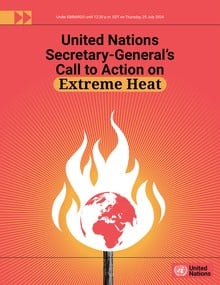 English: https://www.un.org/en/climatechange/extreme-heat
English: https://www.un.org/en/climatechange/extreme-heat
French: https://www.un.org/fr/climatechange/extreme-heat
Spanish: https://www.un.org/es/climatechange/extreme-heat
Call to Action in English: https://tinyurl.com/4622uw3u
Crippling heat is everywhere. Billions of people around the world are wilting under increasingly severe heatwaves driven largely by a fossil-fuel charged, human-induced climate crisis. More than 70 per cent of the global workforce – 2.4 billion people – are now at high risk of extreme heat. The most vulnerable communities are hit hardest. In response to the rapid rise in the scale, intensity, frequency and duration of extreme heat, UN Secretary-General António Guterres on 25 July 2024 called for an urgent and concerted effort to enhance international cooperation to address extreme heat in four critical areas: – Caring for the vulnerable; – Protecting workers; – Boosting resilience of economies and societies using data and science; – Limiting temperature rise to 1.5°C by phasing out fossil fuels and scaling up investment in renewable energy.
Heat at work: Implications for safety and health; A global review of the science, policy and practice (ILO)
https://www.ilo.org/publications/heat-work-implications-safety-and-health
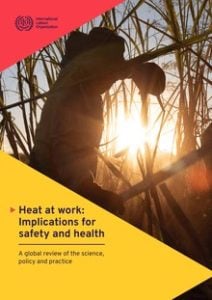
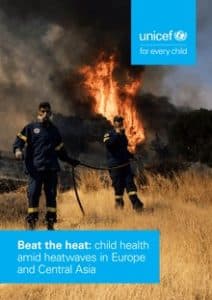
https://www.unicef.org/eca/reports/beat-heat-2024
https://www.unicef.org/eca/media/35706/file/Beat%20the%20Heat%202024.pdf
Half of all children living in 50 countries across Europe and Central Asia are exposed to frequent heatwaves – double the global average of 1 in 4 children. More than 92 million children are already exposed to frequent heatwaves in a region where temperatures are rising at a faster rate than in any other region worldwide. Heatwaves are set to increase in frequency and intensity in the coming years as a result of accelerated global warming. Rising temperatures are expected to increase the risk of heat stress in children in 23 countries across Europe and Central Asia, and urgent measures are needed to protect the most vulnerable people of all: the youngest children.
Synergy Solutions for Climate and SDG Action: Bridging the Ambition Gap for the Future We Want
https://sdgs.un.org/publications/synergy-solutions-climate-and-sdg-action-bridging-ambition-gap-future-we-want-56106
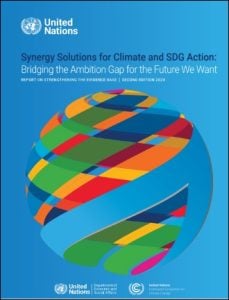
The report, a practical response to uncovering challenges and opportunities for revitalizing action towards just and equitable societies on a healthy planet, comes at a crucial time. By 2025, all parties to the Paris Agreement are scheduled to submit new NDCs, which must be more ambitious and build adequate resilience to climate change. The upcoming COP29 in Baku later this year is an opportunity to set a new target for climate finance and ensure a just transition to keep the average temperature rise under the 1.5-degree threshold this century. This report offers a roadmap for breaking down fragmentation and achieving the deep transformative changes required. Focusing on synergies between climate action and sustainable development is vital to overcoming challenges, providing win-win solutions, and minimizing trade-offs.
Navigating New Horizons: A Global Foresight Report on Planetary Health and Human Wellbeing
Report in English, Executive Summary in English, French, Spanish & Portuguese: https://www.unep.org/resources/global-foresight-report
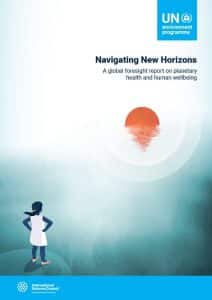
Economic Growth and Sustainable Development
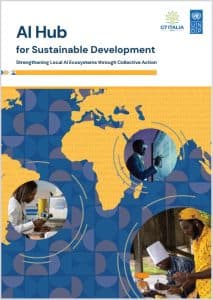
https://www.undp.org/publications/ai-hub-sustainable-development-strengthening-local-ai-ecosystems-through-collective-action
The G7 Leaders’ Summit in June 2024 welcomed the Italian Presidency’s decision to establish the AI Hub for Sustainable Development, in collaboration with UNDP. As affirmed in the G7 Leaders’ Declaration, the AI Hub aims to enable multi-stakeholder partnerships to support local AI digital ecosystems, strengthen capacities to advance AI for sustainable development, and complement existing initiatives including the AI for Development Donors Partnership. This is the first public report on the co-design of the AI Hub. It lays out initial suggestions and consolidated feedback from local AI ecosystems to understand opportunities and enhance ongoing AI development initiatives underway.
City leadership for age-friendly communities in the post-pandemic era: five lessons for building health emergency resilience from 16 European cities (WHO/Europe)
https://www.who.int/europe/publications/i/item/WHO-EURO-2024-8409-48181-74811
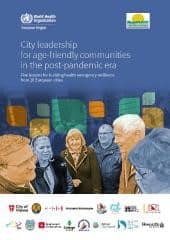
The report was co-produced by the WHO Regional Office for Europe and the cities of Barcelona (Spain), Belfast (United Kingdom), Brno (Czechia), Çankaya (Türkiye), Derry/Londonderry (United Kingdom), Gyor (Hungary), Horsens (Denmark), Łódź (Poland), Metamorphosis (Greece), Muratpaşa (Türkiye), Newcastle (United Kingdom), Novi Sad (Serbia), Rijeka (Croatia), Udine (Italy), Utrecht (Netherlands, Kingdom of the) and Vienna (Austria).
Climate change risks to marine ecosystems and fisheries: Projections to 2100 from the Fisheries and Marine Ecosystem Model Intercomparison Project (FAO)
https://doi.org/10.4060/cd1379en
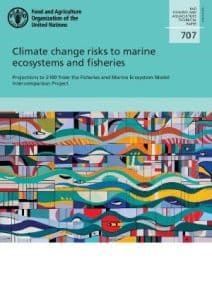
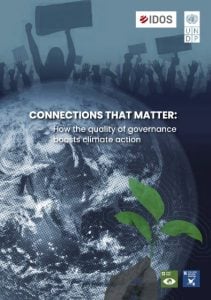
https://www.undp.org/publications/connections-matter-how-quality-governance-boosts-climate-action
This report reflects the findings of a systematic literature review jointly undertaken by the UNDP Global Policy Centre for Governance and the German Institute of Development and Sustainability. The report offers aggregated empirical insight from across the globe about how inclusive, effective and accountable governance systems produces positive effects on climate action. The report aims to galvanize development actors and stakeholders to invest in SDG 16 and the strengthening of governance systems, and to better identify pathways that raise the ambition and effectiveness of climate action.
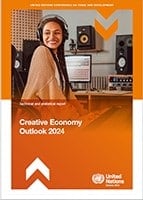
https://unctad.org/publication/creative-economy-outlook-2024
The creative economy includes audiovisual products, design, media, music, performing arts, publishing and visual arts. An evolving concept by nature, it involves goods and services based on creativity and intellectual capital as primary inputs. With exports of these products growing strongly in recent years, robust regulatory frameworks are necessary to ensure technologies like artificial intelligence (AI) benefit everyone and foster a competitive and sustainable creative economy. That’s the main message from the Creative Economy Outlook 2024 released by UN Trade and Development (UNCTAD). The report comes as government officials, businesses and researchers convene in Geneva for the 11th Multi-year Expert Meeting on Trade, Services and Development from 10 to 12 July. The meeting looks closely at global trade trends of creative services amid the growing impact of digitalization on development opportunities, challenges and policy implications. Participants also discuss ways to better collect and leverage statistics on trade in services.

https://unctad.org/publication/digital-economy-report-2024
UN Trade and Development (UNCTAD) launched The Digital Economy Report 2024 on 10 July 2024, shedding light on the significant environmental impact of the global digital sector and the disproportionate burden developing countries bear. This detailed report highlights that while digitalization drives global economic growth and offers unique opportunities for developing countries, its environmental repercussions are becoming increasingly severe. Developing countries remain unevenly affected both economically and ecologically due to existing digital and development divides but they have the potential to leverage this digital shift to foster development. The report emphasizes the pressing need to address the environmental costs of rapid digital transformation. Key concerns include the depletion of finite raw materials for digital and low-carbon technologies, escalating water and energy consumption and the growing issue of digitalization-related waste. As digitalization progresses at an unprecedented rate, understanding its link to environmental sustainability becomes increasingly critical.
Disability weights for noise-related health states in the WHO European Region
https://www.who.int/europe/publications/i/item/WHO-EURO-2024-9196-48968-72969
Following the publication of the 2018 Environmental noise guidelines for the European Region, WHO set out to update environmental noise related disability weights to enhance health risk assessment in the field. The “European noise disability weights measurement study”, on which this report is based, aimed to derive disability weights for several environmental and non-environmental noise related health states using standardized and comparable methods. A nationally representative sample survey was administered in the general populations of four countries of the WHO European Region – Hungary, Italy, Netherlands (Kingdom of the) and Sweden. Disability weights for moderate and severe annoyance were estimated to be 0.006 and 0.011, respectively. The disability weight for sleep disturbance was estimated to be 0.009. The set of European noise disability weights is a valuable resource for use in future environment-related health risk assessments across the WHO European Region and beyond.
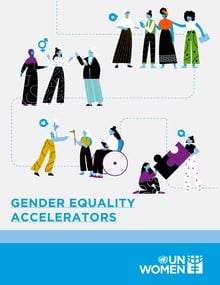
https://www.unwomen.org/en/digital-library/publications/2024/07/gender-equality-accelerators
This booklet introduces the 10 Gender Equality Accelerators, designed to propel progress and ensure substantial results in line with the SDGs. Through them, UN women addresses the pressing need for strategic action to achieve gender equality and women’s rights. The accelerators are not a ‘one size fits all’ solution but are tailored to fit individual national contexts and priorities, implemented in collaboration with national stakeholders. The booklet emphasizes the importance of synergies between normative, operational, and coordination aspects to achieve sustainable and long-lasting results. By collaborating with allies, leveraging expertise, and harnessing available capacities, significant progress can be made. The Gender Equality Accelerators represent a call to action for governments, the UN system, and civil society to drive transformative change, advancing gender equality and the rights of women and girls worldwide. The Accelerators are a blueprint that UN Women offers to the UN Resident Coordinator system for collective action to achieve gender equality and contribute towards the full realization of the 2030 Agenda for Sustainable Development.
Closing the Gap: Trends in Adaptation Finance for Fragile and Conflict-affected Settings (World Bank)
https://hdl.handle.net/10986/41912
Global funds to support climate adaptation are a lifeline for low-income countries, and nowhere is this more evident than in settings facing fragility and conflict. While there is little question that countries on the World Bank’s Fragile and Conflict-affected Situations (FCS) list are underserved in terms of adaptation finance received from international funders, the scale and nature of the financing gap compared to other low-income countries are less clear. By consolidating a decade’s worth of climate finance data from international funders, this report examines global financial flows to support adaptation in fragile and conflict affected settings. Using a database that covers international climate finance commitments from major bilateral, multilateral, and philanthropic funders, it explores the size and nature of adaptation finance to FCS. The analysis goes further than existing studies, by comparing not just the financial flows going to FCS and non-FCS countries, but also those going to different FCS countries. This allows us to determine whether adaptation finance is targeting the most vulnerable countries and begin to explore factors associated with differences in funding allocations. This report is part of a wider research program aimed at uncovering barriers and entry points to scaling adaptation finance as part of the World Bank’s Scaling Adaptation Finance in Fragile Environments (SAFFE) activity.

https://openknowledge.fao.org/handle/20.500.14283/cd1543en
The Food and Agriculture Organization of the United Nations (FAO) and the United Nations Convention to Combat Desertification (UNCCD) have published this comprehensive guideline designed to raise awareness among policymakers about the significant development challenges posed by Sand and Dust Storms (SDS), which are often inadequately addressed. SDS can have severe impacts on agriculture, human health and infrastructure, and require urgent and coordinated policy responses. The new guideline emphasizes the necessity for increased political attention, robust assessments, and actionable data to manage SDS hazards more effectively. It draws on a wide range of scientific, technical, and evidence-based resources provided by FAO, UNCCD and members of the United Nations Coalition on Combatting Sand and Dust Storms, alongside contributions from global experts and partners. The guideline is designed to be a voluntary resource for regional, national, and sub-national authorities, as well as other stakeholders involved in developing and implementing SDS-related policies and initiatives. It builds upon the UNCCD Policy Advocacy Framework for Sand and Dust Storms, which outlines essential principles and an enabling environment aimed at preventing and mitigating the sources and socioeconomic impacts of SDS, thereby enhancing productivity and resilience.

https://doi.org/10.4060/cd1090en
The Food and Agriculture Organization of the United Nations (FAO) has released guidelines in July 2024 for countries outlining how to manage the risks of damaging wildfires, which can threaten people and the environment. The guidelines update previous FAO fire management voluntary guidelines that were published two decades ago and incorporates new content to address challenges stemming from the current climate crisis. Extreme wildfires are projected to become about 50 percent more frequent by the end of the century and environmental changes linked to climate change, such as increased drought, high air temperatures and strong winds, are likely to result in hotter, drier, and longer fire seasons. Currently, around 340 million to 370 million hectares of the Earth’s surface are burned by wildfire annually. When these wildfires become extreme, they can adversely affect sustainable development, threaten communities’ livelihoods, and generate large volumes of greenhouse gas emissions.
Mind the AI Divide: Shaping a Global Perspective on the Future of Work
https://www.ilo.org/publications/major-publications/mind-ai-divide-shaping-global-perspective-future-work
The Artificial Intelligence revolution will only widen the gap between high and low-income countries unless cooperative international action is taken, this new report from the ILO and the UN Office of the Secretary General’s Envoy on Technology warns. The report found that AI is revolutionizing industries worldwide, offering tremendous opportunities for innovation and productivity. However, it is also exacerbating economic and social inequalities due to uneven rates of investment, adoption, and use. This emerging “AI divide” means high-income nations disproportionately benefit from AI advancements, while low- and medium-income countries, particularly in Africa, lag behind. The workplace is where Artificial Intelligence can lead to productivity gains and improved working conditions. Unequal access to infrastructure, technology, quality education, and training, however, could lead to uneven adoption of AI, which would, in turn, deepen inequalities globally.
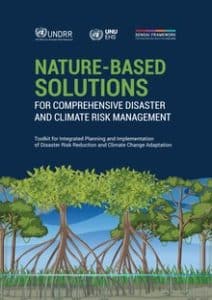
https://www.undrr.org/publication/nature-based-solutions-comprehensive-disaster-and-climate-risk-management-toolkit
The toolkit on nature-based solutions for comprehensive disaster and climate risk management (CRM-NbS Toolkit) aims to support countries in making nature-based solutions (NbS) an integral part of planning under the comprehensive disaster and climate risk management (CRM) approach considering both disaster risk reduction (DRR) and climate change. As a summary, this toolkit proposes a checklist for checking progress along the sequence of tools proposed in this toolbox, thereby helping to “take the steps” for planning NbS as a coherent order of actions for CRM. It also informs on the integration of national and subnational agendas for cooperation and coordination among various governance levels and multiple sectors.
New estimates of the cost of ending poverty and its global distribution (UNU- WIDER Working Paper 46/2024)
https://doi.org/10.35188/UNU-WIDER/2024/508-0
This paper makes new estimates of the cost of ending poverty and the global distribution of both the cost and poverty itself. First, the paper discusses definitions of ‘ending’ poverty, arguing that there is an overemphasis (e.g. SDG 1) on the extreme poverty line which is insufficient for multiple reasons. Second, we turn to the question of the location of global poverty. Although it is commonly noted that global poverty is increasingly located within sub-Saharan Africa and in fragile and conflict-affected states (FCAS), there is a less discussed distribution of global poverty between countries where official development assistance (ODA) matters substantially, and those countries where ODA is no longer financially significant relative to the recipient countries’ growing economic size. A new typology of countries is presented based on the intersection of ODA importance vis-à-vis national resources and FCAS/non-FCAS countries. Finally, new estimates are made for the cost of ending global poverty and for the global distribution of that cost and of poverty itself.
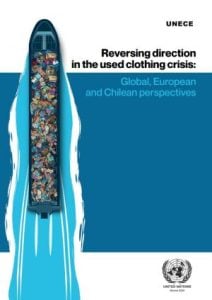
Report: https://unece.org/info/publications/pub/391996
Executive Summary: https://tinyurl.com/2tf7da3a
The textile industry has evolved from a production model based on natural fibres and protectionist policies for local industry to a model where synthetic fibres have become pervasive, production has been offshored, and the speed of manufacture and distribution of products has increased rapidly. Most of the fashion industry operates under the fast-fashion model, which involves more collections per year, generally at low prices, used for less and less time. This has led to a growing rate of overproduction and overconsumption of clothes.
These excesses have boosted the development of an important market for second-hand clothes, with international trade worth USD 9.3 billion in 2021. These garments largely flow from higher- to lower-income countries. The main exporters (by value) are the EU, China, the United States, and the United Kingdom, and the principal importers are Pakistan, Ukraine, Kenya, and Chile.
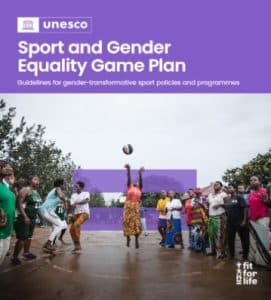
https://tinyurl.com/y4k3yf9u
On the eve of the Olympic Games, a new UNESCO report reveals that women and girls are still far from having equal access to sport at any level, professional or amateur. UNESCO urgently calls on its 194 Member States to tackle these inequalities by putting in place the recommendations contained in the report. On 24 July, the Organization brought together sports ministers from around the world at its Paris headquarters to develop concrete political actions.
The UNESCO Sport and Gender Equality Game Plan is a road-map for policy-makers in both governments and sports organizations responsible for driving forward gender equity. It highlights three urgent challenges facing girls and women in sport: – Ending gender-based violence in sport; – Reducing teenage girls’ dropout from sport; – More women needed in sports leadership roles.
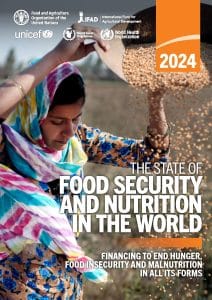
https://doi.org/10.4060/cd1254en
This year’s report provides timely and relevant recommendations regarding the efficient use of innovative financing tools and reforms to the food security and nutrition financing architecture. Establishing a common ground on how food security and nutrition financing is defined, along with methods for its tracking, measurement and implementation, is an important first step towards sustainably increasing the financing flows needed to end hunger, food insecurity and all forms of malnutrition, and to ensure access to healthy diets for all, today and tomorrow. To this end, insights of this report are particularly important in light of the next Summit of the Future in September 2024 and the Fourth International Conference on Financing for Development in June and July 2025.
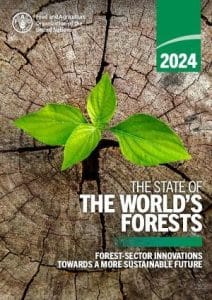
https://doi.org/10.4060/cd1211en
Innovation is essential for achieving the 2030 Agenda for Sustainable Development and the Sustainable Development Goals. It is also an important accelerator for the transformation to more efficient, inclusive, resilient and sustainable agrifood systems and for achieving global goals such as the eradication of hunger and poverty and the sustainable management and use of natural resources.But innovation does not arise in a vacuum. Among other things, it requires enabling policies; strong, transformative partnerships; investment; an inclusive culture that is open to and encouraging of new ideas; and a willingness to take calculated risks. This edition of The State of the World’s Forests (SOFO) provides highlights on the state of the world’s forests and explores the transformative power of evidence-based innovation in the forest sector, ranging from new technologies to creative and successful policies and institutional changes, to new ways of getting finance to forest owners and managers. Eighteen case studies from around the world provide a glimpse at the wide range of technological, social, policy, institutional and financial forest-sector innovations – and combinations of these – being tested and implemented in real-world conditions. SOFO 2024 identifies barriers to, and enablers of, innovation and enumerates five actions for empowering people to apply their creativity in the forest sector to solve problems and scale up positive impacts.
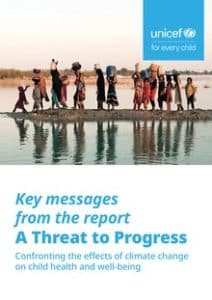
English, French & Spanish: https://www.unicef.org/reports/threat-to-progress
Climate change is impacting almost every aspect of child health and well-being from pregnancy to adolescence. Children are disproportionately affected by climate change because they are uniquely vulnerable to environmental hazards compared to adults.
While the evidence on the impact of climate change on children’s health and well-being is growing, research often focuses on the effects of individual hazards. This report aims to provide a comprehensive ‘stocktake’ of the impacts of climate change on children across six major hazards that impact their health and well-being: extreme heat, droughts, wildfires, floods and storms, air pollution and ecosystem changes. This report makes three recommendations with accompanying specific actions: – Reduce emissions to meet 1.5°C degree threshold ensuring the best interest of the child; – Protect children from the impact of climate change; – Prioritize child health and well-being in climate policy, investment and action.
Transforming Vision into Reality: The 2024 Global Alliance Progress Report on Ending AIDS in Children by 2030
Report in English, Executive Summary in English, French & Portuguese: https://www.unaids.org/en/resources/documents/2024/transforming-vision-into-reality
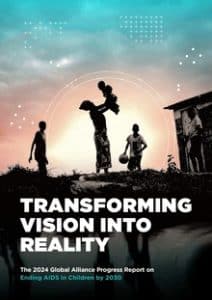
The Urgency of Now: AIDS at a Crossroads — 2024 global AIDS update
https://www.unaids.org/en/resources/documents/2024/global-aids-update-2024
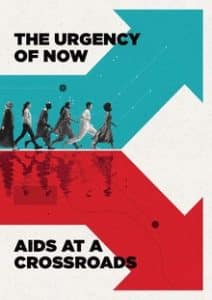
World Population Prospects 2024 (UN/DESA)
https://www.un.org/development/desa/pd/world-population-prospects-2024
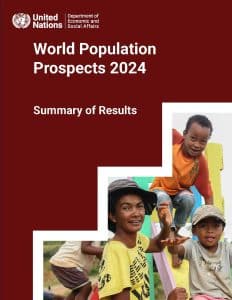
see also: Growing or shrinking – what do the latest trends tell us about the global population? (10 June 2024): https://www.un.org/en/desa-en/growing-or-shrinking-%E2%80%93-what-do-latest-trends-tell-us-about-global-population
World Trade Statistics 2023: Key insights and trends – WTO new interactive tool
https://www.wto.org/english/res_e/statis_e/statistics2023_e.htm

Coronavirus Disease (COVID-19)
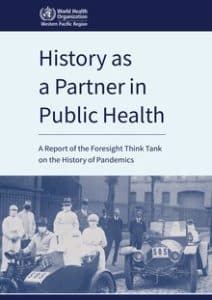
https://www.who.int/publications/i/item/9789290620471
At the onset of the COVID-19 pandemic, the Data, Strategy and Innovation group of the WHO Regional Office for the Western Pacific collaborated with eight historians to delve into the history of pandemics. This report captures their analysis of 14 interconnected themes that have significance for past and future pandemics. These are: pandemic narratives; social contracts; data and trust; mental health and emotional suffering; rumours and conspiracy; changed behaviours; international versus national interests; political and social movements; getting the response right; inequalities; community; innovations; the environment; and the economy. By understanding historical precedents, health decision-makers can better respond to future public health threats.
International Peace and Security
Concept note for the Security Council ministerial open debate on the theme “Multilateral cooperation in the interest of a more just, democratic and sustainable world order”
English, French & Spanish: https://undocs.org/S/2024/537
The Russian Federation, in its capacity as President of the Security Council for the month of July 2024, held an open debate on 16 July 2024 on the theme “Multilateral cooperation in the interest of a more just, democratic and sustainable world order”. This concept note was prepared for the meeting.
see also: Polarised Security Council debates meaning of multilateralism (UN News, 16 July 2024): https://news.un.org/en/story/2024/07/1152166
Concept note for the Security Council debate on the theme “Cooperation between the United Nations and regional and subregional organizations in maintaining international peace and security: the Collective Security Treaty Organization (CSTO), the Commonwealth of Independent States (CIS), the Shanghai Cooperation Organization (SCO)”
English, French & Spanish: https://undocs.org/S/2024/538
The Russian Federation, in its capacity as President of the Security Council for the month of July 2024, held a debate on the theme “Cooperation between the United Nations and regional and subregional organizations in maintaining international peace and security: the Collective Security Treaty Organization (CSTO), the Commonwealth of Independent States (CIS), the Shanghai Cooperation Organization (SCO)” on 19 July 2024. This concept note was prepared for the meeting.
Concept note for the Security Council briefing on women and peace and security entitled “Sustaining women and peace and security commitments in the context of accelerated drawdown of peace operations”
English, French & Spanish: https://undocs.org/S/2024/573
The Security Council held a briefing on 7 August 2024 on women and peace and security entitled “Sustaining women and peace and security commitments in the context of accelerated drawdown of peace operations”, convened by Sierra Leone in its capacity as President of the Security Council for the month of August 2024. This concept note was prepared for the meeting.
Concept note for the Security Council briefing on the theme “Threats to international peace and security caused by terrorist acts in West Africa and the Sahel”
English, French & Spanish: https://undocs.org/S/2024/589
The Security Council held a briefing on 8 August 2024 on the theme “Threats to international peace and security caused by terrorist acts in West Africa and the Sahel”, convened by Sierra Leone in its capacity as President of the Council for the month of August 2024. This concept note was prepared for the meeting.
Concept note for the Security Council high-level debate on “Maintenance of international peace and security: addressing the historical injustice and enhancing Africa’s effective representation on the Security Council”
English, French & Spanish: https://undocs.org/S/2024/574
The Security Council will hold a high-level debate on “Maintenance of international peace and security: addressing the historical injustice and enhancing Africa’s effective representation on the Security Council”, to be convened on 12 August 2024 by Sierra Leone in its capacity as President of the Security Council for August 2024.This concept note was prepared for the meeting.
Concept note for the Security Council high-level open debate on “Peacebuilding and sustaining peace: the New Agenda for Peace – addressing global, regional and national aspects of conflict prevention”
English, French & Spanish: https://undocs.org/S/2024/581
The Security Council will hold a high-level open debate on “Peacebuilding and sustaining peace: the New Agenda for Peace – addressing global, regional and national aspects of conflict prevention”, to be convened on 21 August 2024 by Sierra Leone in its capacity as President of the Council for August 2024. This concept note was prepared for the meeting.
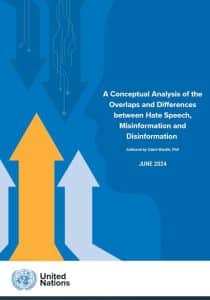
https://tinyurl.com/ymmn7mdx
As part of events marking the 3rd International Day for Countering Hate Speech on 18 June 2024, a new report was released examining hate speech, misinformation and disinformation, particularly in conflict-affected and high-risk areas. The report found that the tendency to group these distinct concepts together without taking into account their differences can make it difficult to address them more effectively. Commissioned by the United Nations Department of Peace Operations (DPO) and the Office of the Special Adviser on the Prevention of Genocide (OSAPG), and written by Dr. Claire Wardle from Brown University’s School of Public Health, the report aims to support both those working on the issues, as well as the general public to navigate hate speech, disinformation and misinformation in complex environments, by helping to clarify what these concepts mean, what they look like, and how best to respond.
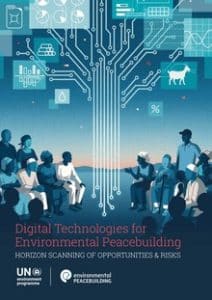
https://www.unep.org/resources/report/digital-technologies-environmental-peacebuilding-horizon-scanning-opportunities
This report specifically delves into how digital technologies can be harnessed to manage environmental and natural resource risks that contribute to insecurity and social conflict, as well as the opportunities they present for peacebuilding, cooperation, and social cohesion. We examine relevant use cases spanning the peace and security continuum and conclude with a set of important policy and governance recommendations. The report is designed to inform and contribute to significant upcoming frameworks addressing digital technologies, including the Summit of the Future and the Global Digital Compact, among others.
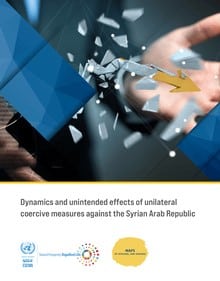
https://unescwa.org/publications/dynamics-effects-measures-syrian-arab-republic
The United Nations Economic and Social Commission for Western Asia (ESCWA) has released on 12 July 2024 this report, shedding light on the impact of these sanctions on various aspects of people’s life in Syria. The report captures the perceptions of 1,179 Syrian respondents, distributed across the whole of Syria. It also includes insights from semi-structured interviews with practitioners and experts. The key findings of the report reveal that a 66% of survey respondents across the whole of Syria expressed opposition to the sanctions, highlighting their adverse effects on their daily life regardless of gender, education, age, political affiliation, or region. Even respondents who supported the sanctions recognized their negative impacts on their livelihoods.
Global Progress Report on Sustainable Development Goal 16 Indicators – At the Crossroads: Breakdown or Breakthrough for Peace, Justice and Strong Institutions (UNODC / OHCHR / UNDP)
https://www.undp.org/publications/2nd-global-progress-report-sdg-16-indicators
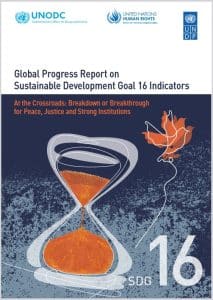
Making Progress on SDG 16: Unlocking the Power of Example (UNDP)
https://www.undp.org/publications/making-progress-sdg-16-unlocking-power-example
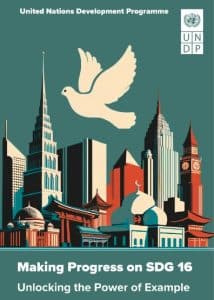
We know that Goal 16 is a cornerstone for achieving all SDGs and interlinks deeply with the achievement of most other parts of the Agenda 2030. The 2nd Global Progress Report on SDG 16 produced by the leading UN entities responsible for globally tracking progress on SDG 16 paints a bleak picture as we have now crossed the halfway mark to Agenda 2030. Governance systems are indeed failing many people, the world is becoming more dangerous, people are increasingly divided, and justice is being denied for too many. But there are some bright spots. This publication aims to shed light on these bright spots where UNDP is working hand in hand with partners. The report notes the positive trend in the diversity of representation in public institutions, with more gender parity in some regions and improvements in the inclusion of young people. Governments are also increasingly prioritizing policies and initiatives which are making real and crucial progress on peace, justice and inclusion. Our hope is that this compilation will serve as inspiration for policymakers, civil society and practitioners in designing the responses that are needed to refocus efforts, accelerate and deepen implementation of Goal 16.
Development of Africa
Africa Sustainable Development Report 2024: Reinforcing the 2030 Agenda and Agenda 2063 and eradicating poverty in times of multiple crises: the effective delivery of sustainable, resilient and innovative solutions
https://repository.uneca.org/handle/10855/50186
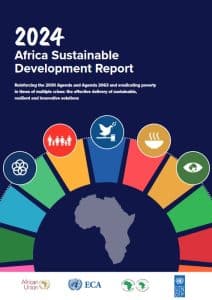
Human Rights
De Facto Authorities’ Moral Oversight in Afghanistan: Impacts on Human Rights (July 2024)
https://unama.unmissions.org/sites/default/files/moral_oversight_report_english_final.pdf
This report is part of a series of thematic studies on current human rights issues of concern, carried out by the United Nations Assistance Mission in Afghanistan’s (UNAMA) Human Rights Service in the framework of Security Council Resolution 2626 (2022), which was most recently extended by Resolution 2727 (2024). Resolution 2626 tasks UNAMA with engaging with “all stakeholders at the national and subnational levels and civil society and international non-governmental organizations (NGOs) in the protection and promotion of the human rights of all Afghans,” and to “monitor, report and advocate with regard to the situation for civilians (and) the prevention and elimination of violence.” As part of this engagement, Afghanistan’s de facto authorities were invited to provide factual comments on the content of the report. They responded in Pashto to UNAMA on 13 May 2024 and the response is included in full in the Annex. Their comments related to specific incidents and issues have been incorporated within the text of the report as appropriate and are italicized.
Detention in the context of the escalation of hostilities in Gaza (October 2023-June 2024) (Thematic Report, 31 July 2024)
https://www.ohchr.org/en/documents/reports/detention-context-escalation-hostilities-gaza
The UN Human Rights Office published on 31 July 2024 this report on arbitrary, prolonged and incommunicado detention by Israeli authorities, affecting thousands of Palestinians since last October. The report also covers allegations of torture and other forms of cruel, inhuman and degrading treatment, including sexual abuse of women and men. Since 7 October, thousands of Palestinians – including medical staff, patients and residents fleeing the conflict, as well as captured fighters – have been taken from Gaza to Israel, usually shackled and blindfolded. Thousands more have been detained in the West Bank and Israel. They have generally been held in secret, without being given a reason for their detention, access to a lawyer or effective judicial review, the report states. At least 53 Palestinian detainees are known to have died in Israeli military facilities and prisons since the horrific attacks by Hamas and other Palestinian armed groups against Israeli civilians on 7 October. The staggering number of men, women, children, doctors, journalists and human rights defenders detained since 7 October, most of them without charge or trial and held in deplorable conditions, along with reports of ill-treatment and torture and violation of due process guarantees, raises serious concerns regarding the arbitrariness and the fundamentally punitive nature of such arrests and detention, said UN Human Rights Chief Volker Türk.
Forced labour by the Democratic People’s Republic of Korea (OHCHR)
https://www.ohchr.org/en/documents/country-reports/forced-labour-democratic-peoples-republic-korea

OHCHR Toolkit: Ratifying the Convention against Torture and Other Cruel, Inhuman or Degrading Treatment or Punishment (CAT)
English & Spanish: https://www.ohchr.org/en/documents/tools-and-resources/toolkit-ratifying-convention-against-torture-and-other-cruel-inhuman
This toolkit presents the benefits of ratifying the Convention against Torture and Other Cruel, Inhuman or Degrading Treatment or Punishment (CAT), answers questions on its content and application, provides a simplified version of the provisions of the Convention and provides practical information on ratification and accession of treaties.
Justice and International Law
Treaty Event 2024: Strengthening the Multilateral Treaty Framework (24 – 27 September 2024, United Nations Headquarters)
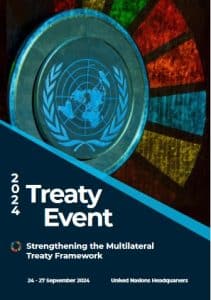
French: https://treaties.un.org/Pages/TreatyEvents.aspx?path=Treaty/Focus/Page1_fr.xml
This year’s Treaty Event will be held from 24 to 27 September 2024 at the United Nations Headquarters in New York, in conjunction with the general debate of the seventy-ninth session of the General Assembly. The Treaty Event will highlight multilateral treaties deposited with the Secretary-General, promoting in particular the Sustainable Development Goals. These cover a wide range of areas of global concern, including human rights, disarmament, penal matters, law of the sea, and the environment. The Treaty Event may also be used to sign and ratify or accede to any treaty for which the Secretary-General acts as depositary.
Drug Control, Crime Prevention and Counter-terrorism
Beneath the Surface: Terrorist and Violent Extremist Use of the Dark Web and Cybercrime-as-a-Service (UNICRI / UNOCT)
https://unicri.it/sites/default/files/2024-07/DW_BtS.pdf
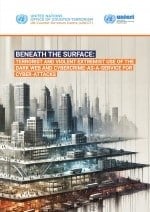
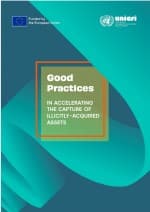
https://unicri.it/index.php/Publication/Good_Practices_Accelerating_Capture_Illicitly-Acquired_Assets
This report, which was produced within the framework of an EU-funded project, focuses on advancing the capabilities of Member States in combating organized crime and promoting development through effective asset recovery. This is done by presenting, through a number of case studies, the usefulness of adopting accelerated mechanisms for asset recovery. Such modalities may include, for example, civil confiscation, enhanced powers of the tax authorities or social welfare institutions, as well as plea bargaining and administrative confiscation. The report addresses the critical challenge of fighting organized crime and corruption by dismantling their financial bases. The goal is to strengthen law enforcement’s ability to – through proven effective and efficient modalities – trace, seize, and confiscate assets that fuel criminal activities, emphasizing the need to ensure that crime does not pay. The publication showcases national and global strategies for accelerated modalities to confiscate illicitly-acquired assets and urges the adoption of these mechanisms through a framework rich in successful case studies. The report aims to align regional practices with international standards to enhance cross-border cooperation against illicit financial flows.
Newsletter Archive: https://unric.org/en/unric-info-point-library-newsletter-archive
